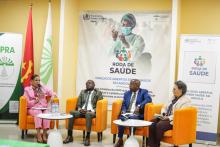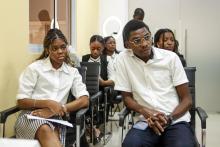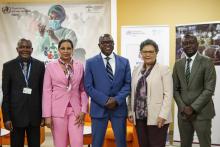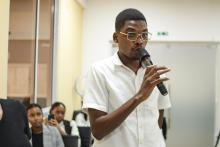Health Circle promotes informed public debate and community participation
The Health Circle, a monthly series of public conversations promoted by the World Health Organization (WHO) in partnership with the Private University of Angola (UPRA), once again brought together experts, academics, government, parliament, and international partners to discuss local and multisectoral solutions to key public health challenges.
After a first edition dedicated to the role of nursing in reducing maternal and neonatal mortality, the second conversation focused on Guinea Worm Disease, highlighting the urgency of a collective effort to eradicate this neglected disease.
The WHO specialist for Neglected Tropical Diseases, Dr. Nzuzi Katondi, argues that eradicating dracunculiasis requires combining science and local knowledge, because “when communities take the lead, they become vigilant, protectors of their own health, and decisive partners in eliminating the disease.”
The event made it clear that elimination depends not only on health interventions, but also on investment in safe drinking water and basic sanitation, active surveillance, and community mobilization.
“There is still no medicine or vaccine for this disease. The solution must be built locally, with communities as protagonists,” said Lúcia Verzotti, representative of the Carter Center in Angola.
Since 2018, Angola has reported 204 cases of dracunculiasis, three in humans and 201 in animals, mainly dogs. Although rare, the disease continues to affect vulnerable rural communities. The Ministry of Health and its international partners are committed to eliminating transmission by 2030.
Dr. Franco Martins, Head of the Disease Control Department of the National Directorate of Public Health, highlighted that transmission is strongly linked to access to safe drinking water and basic sanitation. ‘‘The Ministry of Health has a strategic plan aligned with other sectors to achieve eradication.”
Inspired by traditional Angolan “conversation circles,” the Health Circle was created in May 2025 as an innovative space to bring experts closer to the population, foster informed public debate, and strengthen health literacy.
With each edition, the initiative consolidates itself as an inclusive and evidence-based platform that promotes cooperation between the government, the private sector, academia, civil society, and international partners. Much more than a space for debate, it is a tool for transforming knowledge into action and strengthening public confidence in health institutions.
In the future, it is expected that this platform will be used to broaden the reflection on other critical public health challenges, reinforcing the role of open and participatory communication in building sustainable solutions.
The path to strengthening Angola’s health system increasingly involves dialogue, multisectoral cooperation, and community leadership.




